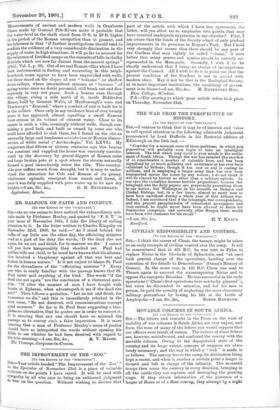KR. BALFOUR ON FAITH AND CONDUCT.
[To THE EDITOR OF THE "SPECTATOR."] Sia,—As no one seems to have noticed the extraordinary mis- take made by Professor Huxley, and quoted by " F. S. T." in your issue of November 16th, I take the liberty of calling attention to it. In the letter written to Charles Kingsley on September 22rd, 1860, he said:—" As I stood behind the coffin of my little son the other day, the officiating minister read as a part of his duty the words, If the dead rise not again, let as eat and drink, for to-morrow we die.' I cannot tell you bow inexpressibly they shocked me. Paul had neither wife nor child, or he must have known that his alterna- tive involved a blasphemy against all that was best and holiest in human nature." Is it not unjust to blame St. Paul for the slovenliness of the " officiating minister " ? Every one who is really familiar with the passage knows that St. Paul never said anything of the kind. The words "if the dead rise not again" are the conclusion of a rhetorical ques- tion: "If after the manner of men I have fought with beasts at Ephesus, what advantageth it me if the dead rise not?" Then follows a quotation, " Let us eat and drink, for to-morrow we die," and this is immediately rebuked in the next verse, "Be not deceived, evil communications corrupt good manners." So far is St. Paul from suggesting a blas- phemous alternative, that he quotes one in order to correct it. It is amazing that any one should have so misread the Passage as to convey such a false impression. It is more amazing that a man of Professor Huxley's sense of justice should have so interpreted the words without opening his Bible to see whether he had been deceived with regard to the true meaning.—I am, Sir, &c., A. V. MAGEE. The Vicarage, Gargraue-in-Craven.














































 Previous page
Previous page